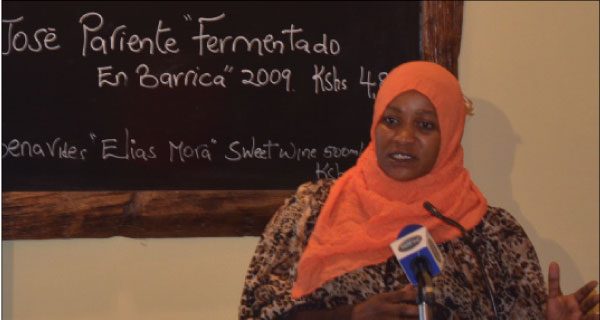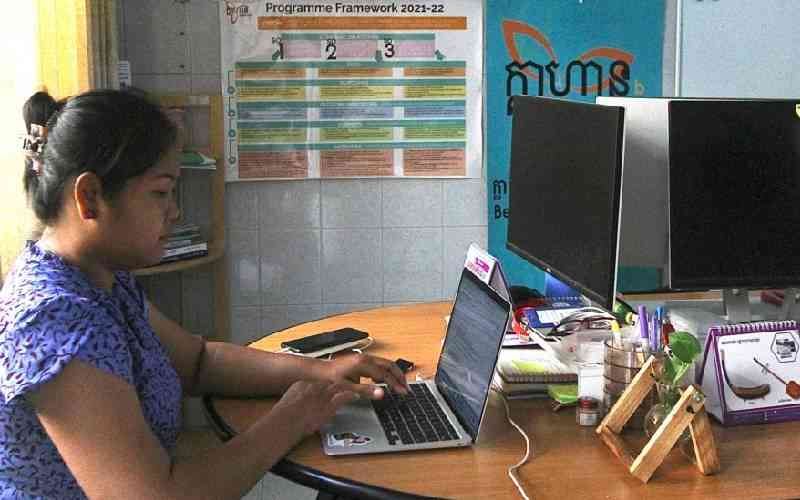 |
|
Fatma Haji executive director KAIH. [PHOTOS: JECKONIA OTIENO/THE STANDARD] |
By JECKONIA OTIENO
Kenya: At 17 years, Maria looks like a 10-year-old, a bit too small for her age. She has cerebral palsy but her story of defilement sparks sadness and anger in equal measure.
She is a mother to a one and a-half-year-old boy, who also looks small for his age, he looks more like a four months old. This has forced Maria’s mother to be the sole-breadwinner and caregiver for her daughter and grandson, despite her meager income.
Maria was defiled at a tender age of 15. The man responsible for her predicament was sentenced for 15 years in prison. He was the caretaker of a mainstream church in Thindigwa, Kiambu County. He would lure the girl with gifts, taking advantage of her situation. Despite her condition, she still talks about it and recalls bits of what would happen during her ordeal in the hands of the church caretaker.
Global problem
“He would buy me sweets and biscuits and then do bad things to me,” says Maria incoherently.
Maria’s situation is a typical example of the plight of girls and women living with mental challenges face. Normal citizens who should be taking care and protecting them from assault and defilement turn against them. Mental health is a major global problem that countries have to grapple with, even as they seek to protect people with psychiatric conditions.
The World Health Organisation (WHO) states that about half of mental disorders begin before the age of 14. The organisation also notes that some of the leading causes of worldwide disability in young people are neuropsychiatric disorders. Also stated is the fact that regions of the world with the highest percentage of population under the age of 19 have the poorest level of mental health resources.
Neglected
Approximately a million people commit suicide with about nine in every ten suicides being in low and middle income countries while those killing themselves are mostly aged between 15 and 44.
The cause of these suicides has been found to be mental disorders that can be treated.
A survey by the Coalition on Violence Against Women (COVAW) in conjunction with Kenya Association for the Intellectually Handicapped (KAIH) found that persons, especially women living with disability are vulnerable to sexual abuse and exclusion in accessing public services. 57 per cent of people living with disability have reported sexual abuse. The study outlines that the most notable form of sexual violation against women with intellectual disability is rape at 15 per cent while defilement follows at 10 per cent.
Like in Maria’s case she was defiled by a person well known to her and her family, more than half of perpetrators of sexual violence on girls and women are by men known to the victims. 49 per cent of the perpetrators are not known to the victims, they are robbers, strangers, public transport service touts or conductors.
More wanting is the fact that family neglects two out of every three of those defiled.
However, this was not the case with Maria, her mother would take care of her but the caretaker would take advantage of her absence whenever she left for church to defile Maria.
Stay informed. Subscribe to our newsletter
Evidential material
During the launch of the findings of the survey, KAIH executive director Fatma Haji said generally institutions around the country are not friendly towards people living with intellectual disabilities.
“It is very sad to find that children who have these disabilities being forced to do the same thing with those who are not, this is discrimination. A student in school should not just be there to be seen but to be allowed an opportunity in life,” says Haji.
Bringing perpetrators to book is also another problem that faces the fight to save women living with intellectual disability from violation. The report states in part: Most cases are dropped due to lack of supporting evidential materials and as well as maintaining the key witnesses all through the conclusion of the case.
During the survey, statistics from the respondents ranged from rape to indecent acts towards the victims. 22 per cent of the cases captured were rape followed by attempted rape at 20 per cent while defilement and attempted defilement comprised 16 per cent and 19 per cent respectively. Cases of sexual assault were at 23 per cent while gang rape came in at five percent. However, compelled or induced indecent acts were the most common at 27 per cent.
As part of its conclusions, the study noted that respondents have a tendency to confuse intellectual disability with mental illness.
This calls for overall development and dissemination of reader-friendly materials to educate the public on disability and associated vulnerability.
 The Standard Group Plc is a
multi-media organization with investments in media platforms spanning newspaper
print operations, television, radio broadcasting, digital and online services. The
Standard Group is recognized as a leading multi-media house in Kenya with a key
influence in matters of national and international interest.
The Standard Group Plc is a
multi-media organization with investments in media platforms spanning newspaper
print operations, television, radio broadcasting, digital and online services. The
Standard Group is recognized as a leading multi-media house in Kenya with a key
influence in matters of national and international interest.
 The Standard Group Plc is a
multi-media organization with investments in media platforms spanning newspaper
print operations, television, radio broadcasting, digital and online services. The
Standard Group is recognized as a leading multi-media house in Kenya with a key
influence in matters of national and international interest.
The Standard Group Plc is a
multi-media organization with investments in media platforms spanning newspaper
print operations, television, radio broadcasting, digital and online services. The
Standard Group is recognized as a leading multi-media house in Kenya with a key
influence in matters of national and international interest.









